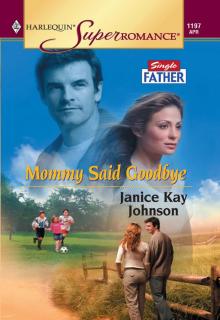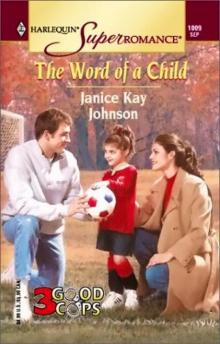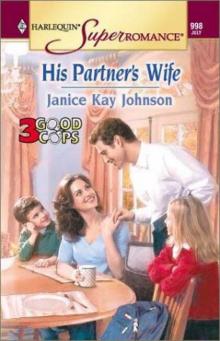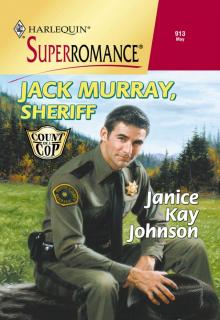- Home
- Janice Kay Johnson
Mommy Said Goodbye Page 2
Mommy Said Goodbye Read online
Page 2
“Good morning. Welcome to sixth grade, and your last year at Roosevelt Elementary School.” She smiled in acknowledgment of the cheers. “I’m Robin McKinnon, and I look forward to getting to know all of you.”
She called roll. Most said, “Hey!” or “That’s me.” Brett flicked a hand in the air and didn’t look up. They talked about seating and agreed to start the year wherever they liked.
“After the first few weeks, once I get to know you, I’m going to start assigning seats.”
Groans.
She smiled. “It’s important for you to learn to work with people who aren’t your best friends. There are rewards, too, in getting to know kids who aren’t in your circle, who maybe have different interests. And finally, I know you’ll concentrate better when you can’t whisper with your best friend.”
Brett, it appeared as the day went on, had no best friend, at least not in this classroom. He spoke to no one. Some of the girls made tentative efforts to flirt with him, not at all to Robin’s surprise; Brett was not only good-looking, but his sulky expression gave him a James Dean air. The other boys were downright wholesome in comparison.
She handed out paperwork for them to go over with their parents concerning her expectations, both for behavior and quality of work. They reviewed math, so she got a sense of where they were, she distributed texts and talked about her requirement for reading: a report a month, each written after reading a book from a different category on a list she gave them. She wanted them to read widely; one sports book was okay, for example, but not nine. The kids always grumbled early on, but her experience was that they found their interests broadening when they dipped into a biography or a play or science fiction or a classic.
At morning recess and lunch, Brett waited until last to slouch out of the classroom door. Robin peeked to see what he did on the playground and saw him shooting baskets by himself. He moved as if he did this often. He’d feint, dribble, shoot and rebound like a pro. As good as he was, no other boy went to join him.
Oh, dear, she thought. Usually she arranged desks in clusters of four once she started assigning seats. Brett was going to be a dark cloud over every group stuck with him if his attitude didn’t improve.
It didn’t.
Although there were no incidents, he stayed sullen through that first three-day week.
On the following Monday, Robin saw another boy poke him as they waited in line to go to P.E., and heard Brett snarl a startling—and forbidden—obscenity.
“Brett!” she snapped. “You will not use that word at school again. Is that clear?”
Eyes filled with dark, churning emotion, he stared at her for a long moment. Then he gave a curt nod.
“Please apologize to Trevor.”
This pause was even longer. Finally he mumbled something that she suspected was as unintelligible to Trevor as it was to her, but she decided not to make an issue of it.
Oh, dear, she thought again.
Tuesday, Amanda Whitney, she of the baby tees and tight jeans, sat down beside him and began tossing her hair and giggling as she tried to coax him to talk.
Brett leveled a cold stare at her and said, “Will you just leave me alone?”
From the other side of the classroom came a boy’s voice. “Jeez, Mandy! Stay away from him. He’s probably a killer like his dad.”
Brett erupted from his desk, sending the chair flying. Shoving aside other desks and kids, he lunged toward a cluster of boys. He crashed into Ryan Durney and the two went down.
Robin yelled, “Stop, now!” and grabbed Brett’s arm before he could punch Ryan.
Ryan scrambled away, his eyes wild. The rest of the kids had gathered in a semicircle, looking scared.
“Back to your seats!”
They went.
Gentling her voice, Robin asked, “Ryan, are you all right?”
He gave a jerky nod.
“Please take your seat, too. I’ll talk to you in a minute.”
She marched an unresisting Brett out onto the small, railed porch of the portable building. Mercifully, the porch of the next portable and the covered breezeway into the main building were deserted. When she released him, he put his back to the railing and waited, head bowed and lank hair hanging over his eyes.
“What were you thinking?” Robin asked.
After a minute, he shrugged.
Her heartbeat was slowing at last, but she still felt shaken by the violence of his reaction. Sixth-grade fights were usually…clumsier. She had never seen an attack so purposeful. Given another ten seconds, he would have hurt Ryan.
“I should send you to the principal’s office,” she said. “I won’t hesitate to do so if you ever, ever, start a fight again. Is that clear?”
He nodded.
“What Ryan said was unkind. It was also spoken out of ignorance.”
Brett’s head shot up. He said hotly, “My dad would never—”
Robin held up a hand. “But that isn’t the point. You cannot go through life attacking every single person who thinks something you don’t like.”
“I should just let people call my dad a murderer.”
“I didn’t say you couldn’t correct them, or even argue. When,” she added sternly, “the setting is appropriate to do so.”
His face set in stubborn lines.
“Have you ever said to Ryan, ‘My mom left my dad. Just because the cops can’t find her doesn’t mean she’s dead’?”
“Nobody will believe me. The cops don’t.”
He had a point. She gave up on reason and said, “If another kid taunts you, I want you to come to me. I’ll talk to him or her, just as I’m going to talk to Ryan. But violence will only convince them that they’re right.”
Anger simmered in his eyes. “Dad didn’t—”
Interrupting, Robin said, “Right now, I neither know nor care. He’s not in my classroom. You are. He isn’t the issue here, any more than are the parents that I know don’t encourage their children to do their homework or who don’t care enough to come to parent conferences. You are responsible for your own behavior, for how you handle your problems. Parents might be part of the problem, but your response is yours alone.” She waited a moment. “Do you understand?”
Jaw still clenched, he jerked his head once.
“Fine.” She touched his rigid arm. “You may return to your desk.”
Stepping into the classroom, she gestured to Ryan, who took a circuitous route to avoid going anywhere near Brett. Robin steered the other boy outside the classroom door.
“I’m glad you weren’t hurt.”
“Jeez! He was like an animal!”
“You said something deeply hurtful.”
His face became wary.
“Tell me, Ryan, do you know anything about Brett’s parents for a fact?” She waited, then continued, “Or have you been listening to gossip that is no more informed than you were a few minutes ago?”
“Everybody says…”
“Has Brett’s father been arrested? Tried?”
He hesitated, then shook his head.
“Don’t you think the police would have arrested Mr. Lofgren if they had any evidence whatsoever to suggest that he killed his wife?”
“But…”
She overrode him. “In this country, we believe people are innocent until proven guilty. Mr. Lofgren is nowhere near being proven guilty. Perhaps more to the point, in this school, and especially in my classroom, nobody deliberately attempts to hurt another person’s feelings. Am I making myself clear?”
Looking both mulish and sheepish—speaking of animals, she thought with a certain wryness—Ryan nodded again.
“Then this incident is forgotten. You may go back to your desk.”
Of course, she was lying. The incident was not forgotten by either boy, or even by her.
Wednesday, she had her students begin journals, which they would leave in their desks every night.
“I’ll read them from time to time.” She wandered amon
g desks, touching a shoulder here, smiling there. “Not to correct them. I want you to write freely about your experiences, your thoughts, your feelings. I’m checking only to be sure that you are in fact using your time to write. Still, be aware that I may read any particular passage, so in a sense you are writing for my eyes.”
She gave them twenty minutes to open their spiral notebooks and—for the most part—stare into space. Each day it would come easier, until the majority of students actually enjoyed this time, took up where they left off, explored contradictory emotions, forgot that they were writing for anyone but themselves.
On Thursday she interrupted a shouting match between Brett and a pair of boys from April Nyholt’s class. They said, “I’m sorry, Ms. McKinnon,” and retired from the battlefield looking smug. Brett smoldered.
Robin wished he could see that his attitude was most of the problem. Other kids in this school had had notorious parents. Students had buzzed a couple of years ago when a sixth-grader’s mother left her father for another woman. But the girl had had the sense to say, “She’s my mom and I love her, but…it is so-o freaky!” Everybody had sympathized and quickly forgotten. Brett didn’t let anybody forget.
Robin didn’t look at her students’ journals until Friday. She asked that they be left out on the desks. When the room was empty, she walked from desk to desk, flipping open the journals.
Some had only a few lines.
I’m going to my dad’s tonight. I hate going! It is so boring!
Robin smiled at the multiple underlines beneath “so,” even though she felt sad at how many children were shuttled between divorced parents’ houses with no regard for where they preferred to be.
One boy wrote in some detail about a Seahawks game to which his uncle had taken him. The excitement shone through, and that provoked another smile. Several kids couldn’t spell, and she made a mental note of their names. Ryan wrote about “that Lofgren kid” trying to beat the crap out of him. “All I said was…” Robin sighed. Her little lecture had apparently not had much impact.
Perhaps deliberately, her route brought her to Brett’s desk last. She opened his journal, started reading and made a small sound of shock.
Oh, dear, was no longer an adequate response.
CHAPTER TWO
CRAIG DID NOT expect to hear from his son’s teacher on a Friday evening. In fact, he didn’t expect to hear from her at all. Last year’s teacher had never once called him in for a conference, even though Brett’s grades sank throughout the year and the principal did summon Craig several times. When Craig showed up for the traditional November parent conferences, Ms. Hayes had appeared uncomfortable and kept their talk as short as she could manage without outright rudeness.
Last week, when he’d asked how the first day of school went, Abby’s face had brightened. “I really like Mrs. Jensen. She’s letting Summer and me sit together.”
Brett shrugged.
Craig had tried a couple of times in the intervening week and a half to talk to his son, but Brett always mumbled, “It’s okay.”
Don’t borrow trouble, Craig warned himself. He didn’t want to assume Brett would do poorly this year. Time was supposed to heal, wasn’t it?
Craig had been gone the past couple of days. He’d flown the polar route to Frankfurt and back. As usual, his father stayed with the kids.
Dad had already fed them when Craig got home at seven-thirty that evening. Waving off Craig’s thanks, he said, “See you Tuesday,” and left.
As he did every single time, Craig wondered what he’d do without his father, who’d retired nearby a few years back. Who else would stay in this house? Something told him that motherly types would not line up outside his door if he ran an ad in the weekly paper asking for live-in help for half the week.
Weary, Craig said hi to Abby, engrossed in a favorite TV show, and to Brett who was hunched over the computer playing Snood. In one way, he was stung by their lack of interest in his arrival home. In another, he was pleased. Abby had clung to him after her mother disappeared. Every time Craig had to leave, she’d sobbed and begged him not to go. Brett had hidden his feelings better, but Craig could feel his anxiety, too. He’d considered quitting his job, maybe seeing if he could fly for a local carrier like Horizon, so that he could be home every night. But just recently, he’d seen an improvement. The kids were beginning to have faith that their Dad would always come home.
On his way to the kitchen, he gave something approaching a laugh. Faith? Hell, maybe they just liked Grandad better. Craig knew damn well that his father wasn’t as demanding as he was. Abby and Brett had manipulating Grandad down to a fine art.
Without interest, Craig gazed into the refrigerator. His father had left a covered plate. Craig lifted the tin foil, saw leftover spaghetti, and stuck it in the microwave to warm even though he wasn’t very hungry. He had to eat.
The microwave was still humming when the phone rang. Craig started. The telephone in this house didn’t ring often.
He lifted the receiver and said cautiously, “Hello?”
A woman’s voice, sounding tentative, said, “May I speak to Mr. Lofgren?”
“This is Craig Lofgren.”
The microwave beeped. He ignored it.
“Oh. This is Robin McKinnon. Brett’s teacher.”
His heart sank. So much for his foolish hope that Brett’s notoriety would wear off and that he might start joining the pack again, so to speak. It seemed Abby was, even if none of her friends were ever able to come home with her to play.
“Yes?”
“I’d like to set up a conference with you, Mr. Lofgren. To discuss Brett.”
“What’s he done?”
There was a moment of silence. “It’s not so much what he’s done as how…unhappy he seems. He’s very isolated, you know.” In this pause, Craig sensed she was searching for words. “He’s angry.”
Angry. That meant Brett was still starting fights. Rubbing the back of his neck, Craig said, “Is Monday too soon? I’m an airline pilot and I fly out again Tuesday.”
“Can you come right after school on Monday? At two-thirty?”
He agreed. “Should I be speaking to Brett about something specific in the meantime?”
“No-o.” She seemed to draw the word out. “I’d rather talk to you first.”
“Is he doing his work?”
“In a perfunctory way.”
Damn it, Brett was a smart kid. He’d been a topnotch student until… Craig grunted. Until his world fell apart.
“Did you say something?” the teacher asked.
“No. I’ll see you Monday.”
He replaced the receiver, then stood frowning into space for a long minute before remembering the spaghetti. He ate without tasting it, dumping half into the garbage. What was Brett doing? Beating the crap out of every kid who said, “Hey, did your dad bury your mom in the backyard?”
Yeah. Probably. Craig could even understand the temptation. There were days he was angry, too. When he sure as hell wanted to punch somebody. He was angry that he couldn’t grocery shop locally without mothers shooing their kids out of his path or all conversation dying around him. He was angry at “friends” who hadn’t known him at all. And sometimes, on really bad days, he hated the cops, and especially Sergeant Michael Caldwell, the investigating officer who had made up his mind from the get-go that Craig had killed his wife and had hounded Craig for the next year.
A week ago, he’d felt sick to realize that he was happy to see in the newspaper that Michael Caldwell had died in a car accident. An easygoing man, Craig had never truly hated before.
And he was lucky enough to be able to escape the miasma of suspicion and judgment when he went to work. Co-pilots and crew came from all over the country. Some didn’t even know about Julie. Others had never met her and had forgotten the notoriety. In the air, he was just Captain Lofgren.
Besides, he had a lifetime of lessons in self-restraint to draw on. Brett was at a tough age anyway. What
scared Craig was the long-term effect of all this anger on Brett. Hormones were putting him through the wringer already. He was supposed to be slamming doors and sulking. He wasn’t supposed to have discovered that theoretically decent people seemed to need to have a leper in their midst whom they could despise and fear. He wasn’t supposed to have discovered already what it was like to be that leper.
Craig tucked Abby in and heard about her week. Summer’s mother, thank God, had allowed her daughter’s friendship with Abby to continue. Summer didn’t come over here, but Craig could live with that. Abby had asked a few times, Summer—or her mother—had made excuses, and Abby had quit asking. But they had her over often and kids her age had been oblivious to the police investigation. Some of them had probably heard now—mothers must give some explanation why little Bridget or Annie couldn’t play at Abby’s house—but even in fourth grade they were too young to care, apparently, about grown-up stuff they didn’t really understand.
“Can I go tomorrow?” she asked, as he pulled the covers up and smoothed them.
He realized he’d missed something. “Go where?”
She rolled her eyes in a good imitation of her brother. “To Mt. Rainier.”
“Just for the day?”
“We’re taking a picnic and stuff. Summer’s brother is bringing his yucky friend, so she needs me.”
“Of course you can go. Maybe I’ll take Brett fishing.”
Her nose scrunched. “If you catch something, I don’t have to eat it, do I?”
Craig laughed. “No, you don’t. Your loss.”
“Uh-huh.”
Still laughing, he kissed her good-night and turned out the light.
He didn’t suggest bedtime for Brett for another couple of hours. Then he wandered in to say good-night and stopped in his tracks.
“Hey! Your bedroom’s clean.”
“Grandad made me.”
Hmm. Maybe his father wasn’t quite the pushover Craig had feared.
“Good. Did he also make you wash a few loads, or is it all piled up in the laundry room waiting for me?”
“Uh… I started a load. Tuesday night.” Then Brett grinned, for a second looking like the cheerful kid he’d once been. “Just kidding. I washed three loads. And folded them.”

 Home Deadly Home
Home Deadly Home From Father to Son
From Father to Son All the Lost Little Horses (A Desperation Creek Novel Book 2)
All the Lost Little Horses (A Desperation Creek Novel Book 2) Hide the Child
Hide the Child Within Range
Within Range Between Love and Duty
Between Love and Duty First Comes Baby
First Comes Baby Charlotte's Homecoming
Charlotte's Homecoming In A Heartbeat (HQR Superromance)
In A Heartbeat (HQR Superromance) The Call of Bravery
The Call of Bravery In Hope's Shadow
In Hope's Shadow Anything for Her
Anything for Her Harlequin Superromance September 2014 - Bundle 1 of 2: This Good ManPromises Under the Peach TreeHusband by Choice
Harlequin Superromance September 2014 - Bundle 1 of 2: This Good ManPromises Under the Peach TreeHusband by Choice The Baby Agenda
The Baby Agenda More Than Neighbors
More Than Neighbors Her Amish Protectors
Her Amish Protectors All That Remains
All That Remains Whisper of Revenge (A Cape Trouble Novel Book 4)
Whisper of Revenge (A Cape Trouble Novel Book 4) In a Heartbeat
In a Heartbeat A Mother's Claim
A Mother's Claim Because of a Girl
Because of a Girl Back Against the Wall
Back Against the Wall Dangerous Waters
Dangerous Waters Mommy Said Goodbye
Mommy Said Goodbye A Mother's Secret
A Mother's Secret See How She Runs (A Cape Trouble Novel Book 2)
See How She Runs (A Cape Trouble Novel Book 2) Plain Refuge
Plain Refuge Bringing Maddie Home
Bringing Maddie Home For the Girls' Sake
For the Girls' Sake Through the Sheriff's Eyes
Through the Sheriff's Eyes Yesterday's Gone (Two Daughters Book 1)
Yesterday's Gone (Two Daughters Book 1) All a Man Is
All a Man Is Harlequin Superromance January 2014 - Bundle 1 of 2: Everywhere She GoesA Promise for the BabyThat Summer at the Shore
Harlequin Superromance January 2014 - Bundle 1 of 2: Everywhere She GoesA Promise for the BabyThat Summer at the Shore No Matter What
No Matter What Wakefield College 01 - Where It May Lead
Wakefield College 01 - Where It May Lead Someone Like Her
Someone Like Her THE WORD OF A CHILD
THE WORD OF A CHILD Harlequin Superromance May 2016 Box Set
Harlequin Superromance May 2016 Box Set Open Secret
Open Secret The New Man
The New Man Finding Her Dad
Finding Her Dad The Perfect Mom
The Perfect Mom All Through The House
All Through The House Match Made in Court
Match Made in Court Making Her Way Home
Making Her Way Home From This Day On
From This Day On To Love a Cop
To Love a Cop The Hero's Redemption
The Hero's Redemption HIS PARTNER'S WIFE
HIS PARTNER'S WIFE Jack Murray, Sheriff
Jack Murray, Sheriff Dead Wrong
Dead Wrong Twisted Threads (A Cape Trouble Novel Book 3)
Twisted Threads (A Cape Trouble Novel Book 3) Bone Deep
Bone Deep The Closer He Gets
The Closer He Gets With Child
With Child Whose Baby?
Whose Baby? Kids by Christmas
Kids by Christmas